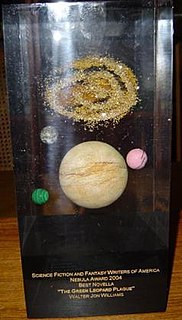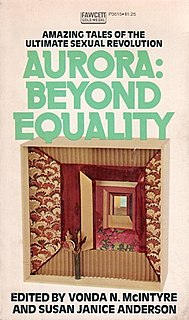Related Research Articles

Brian Wilson Aldiss was an English writer, artist, and anthology editor, best known for science fiction novels and short stories. His byline reads either Brian W. Aldiss or simply Brian Aldiss, except for occasional pseudonyms during the mid-1960s.

James Benjamin Blish was an American science fiction and fantasy writer. He is best known for his Cities in Flight novels, and his series of Star Trek novelizations written with his wife, J. A. Lawrence. He is credited with creating the term "gas giant" to refer to large planetary bodies.
Gordon Rupert Dickson was a Canadian-American science fiction writer. He was inducted into the Science Fiction and Fantasy Hall of Fame in 2000.

Algirdas Jonas "Algis" Budrys was a Lithuanian-American science fiction author, editor, and critic. He was also known under the pen names Frank Mason, Alger Rome, John A. Sentry, William Scarff, and Paul Janvier. He is known for the influential 1960 novel Rogue Moon.

Robert Silverberg is an American author and editor, best known for writing science fiction. He is a multiple winner of both Hugo and Nebula Awards, a member of the Science Fiction and Fantasy Hall of Fame, and a Grand Master of SF. He has attended every Hugo Awards ceremony since the inaugural event in 1953.

The Nebula Award for Best Script was given each year by the Science Fiction and Fantasy Writers of America (SFWA) for science fiction or fantasy scripts for movies or television episodes. Awards are also given out for published literary works in the novel, novella, novelette, and short story categories. The Nebula Award for Best Script was awarded annually from 1974 through 1978, and from 2000 through 2009. It was presented under several names; in 1974, 1975, and 1977 the award was for Best Dramatic Presentation, while in 1976 the award was for Best Dramatic Writing. The award was discontinued in 2010 and replaced with The Ray Bradbury Award for Outstanding Dramatic Presentation; this award, though not a Nebula, is presented at the Nebula Awards Ceremony and follows Nebula rules and procedures. The Nebula Awards have been described as one of "the most important of the American science fiction awards" and "the science-fiction and fantasy equivalent" of the Emmy Awards.

The Nebula Award for Best Short Story is a literary award assigned each year by Science Fiction and Fantasy Writers of America (SFWA) for science fiction or fantasy short stories. A work of fiction is defined by the organization as a short story if it is less than 7,500 words; awards are also given out for longer works in the categories of novel, novella, and novelette. To be eligible for Nebula Award consideration a short story must be published in English in the United States. Works published in English elsewhere in the world are also eligible provided they are released on either a website or in an electronic edition. The Nebula Award for Best Short Story has been awarded annually since 1966. The award has been described as one of "the most important of the American science fiction awards" and "the science-fiction and fantasy equivalent" of the Emmy Awards.

Kate Wilhelm was an American author. She wrote novels and stories in the science fiction, mystery, and suspense genres, including the Hugo Award–winning Where Late the Sweet Birds Sang, and she established the Clarion Workshop with her husband Damon Knight and writer Robin Scott Wilson.

Jack Cady was an American author, born in Kentucky. He is known mostly as an award winning writer of fantasy, horror, and science fiction. He won the Nebula Award, the World Fantasy Award, and the Bram Stoker Award.

Richard "Rick" Dirrane Bowes is an American author of science fiction and fantasy.

The Science Fiction Hall of Fame, Volume Two is an English language science fiction two-volume anthology edited by Ben Bova and published in the U.S. by Doubleday in 1973, distinguished as volumes "Two A" and "Two B". In the U.K. they were published by Gollancz as Volume Two (1973) and Volume Three (1974). The original U.S. subtitle was The Greatest Science Fiction Novellas of All Time.

The Nebula Awards annually recognize the best works of science fiction or fantasy published in the United States. The awards are organized and awarded by the Science Fiction and Fantasy Writers of America (SFWA), a nonprofit association of professional science fiction and fantasy writers. They were first given in 1966 at a ceremony created for the awards, and are given in four categories for different lengths of literary works. A fifth category for film and television episode scripts was given 1974–78 and 2000–09, and a sixth category for game writing was begun in 2018. In 2019 SFWA announced that two awards that were previously run under the same rules but not considered Nebula awards—the Andre Norton Award for Middle Grade and Young Adult Fiction and the Ray Bradbury Award for Outstanding Dramatic Presentation—were to be considered official Nebula awards. The rules governing the Nebula Awards have changed several times during the awards' history, most recently in 2010. The SFWA Nebula Conference, at which the awards are announced and presented, is held each spring in the United States. Locations vary from year to year.

The 1975 Annual World's Best SF is an anthology of science fiction short stories edited by Donald A. Wollheim and Arthur W. Saha, the fourth volume in a series of nineteen. It was first published in paperback by DAW Books in May 1975, followed by a hardcover edition issued in September of the same year by the same publisher as a selection of the Science Fiction Book Club. For the hardcover edition the original cover art of Jack Gaughan was replaced by a new cover painting by Richard V. Corben. The paperback edition was reissued by DAW in December 1980 under the variant title Wollheim's World's Best SF: Series Four, this time with cover art by Vicente Segrelles. A British hardcover edition was published by The Elmfield Press in November 1976 under the variant title The World's Best SF Short Stories No. 2.

List of the published work of Robert Silverberg, American science fiction author.

Nebula Award Stories 11 is an anthology of science fiction short works edited by Ursula K. Le Guin. It was first published in the United Kingdom in hardcover by Gollancz in November 1976. The first American edition was published in hardcover by Harper & Row in February 1977. Paperback editions followed from Corgi in the U.K. in July 1978, and Bantam Books in the U.S. in August 1978. The American editions bore the variant title Nebula Award Stories Eleven.

Nebula Award Stories Two is an anthology of science fiction short stories edited by Brian W. Aldiss and Harry Harrison. It was first published in hardcover by Doubleday in September 1967, with a Science Fiction Book Club edition following in November 1969. The first British edition was published by Gollancz in 1967, under the variant title Nebula Award Stories 1967. Paperback editions followed from Pocket Books in the U.S. in September 1968, and Panther in the U.K. in 1970. The Panther edition bore the variant title Nebula Award Stories 2. The book was more recently reissued by Stealth Press in hardcover in September 2001. It has also been published in German.
"How Interesting: A Tiny Man" is a 2010 science fiction/magical realism short story by American writer Harlan Ellison. It was first published in Realms of Fantasy.
Gregory Patrick Feeley is an American teacher, critic, essayist and author of speculative fiction, active in the field since 1972. He writes as Gregory Feeley, with some of his early works appearing under the name Greg Feeley.

Aurora: Beyond Equality is an anthology of feminist science fiction edited by Vonda N. McIntyre and Susan Janice Anderson and published in 1976.
"Time Deer" is a 1974 magic realism short story by Craig Strete. It was first published in Red Planet Earth, in June 1974, and subsequently republished in Worlds of If, in November 1974.
References
- ↑ Silverberg, Robert (1978). New Dimensions: Science Fiction No. 8. Harper & Row. p. 134.
- ↑ http://dpsinfo.com/awardweb/nebulas/80s.html Archived 2018-08-17 at the Wayback Machine Nebula Final Ballots from the 1980s, accessed March 11, 2011
- ↑ http://dpsinfo.com/awardweb/nebulas/70s.html Archived 2007-12-18 at the Wayback Machine Nebula Final Ballots from the 1970s, accessed March 11, 2011
- ↑ Harry Harrison and Brian Aldiss, The Year'S Best Science Fiction No 8, Sphere SF, 1974, p 219
- ↑ Strete, Craig (1977) The Bleeding Man and Other Science Fiction Stories, Greenwillow Books/William Morrow
- ↑ Strete, Craig (1980) If All Else Fails..., Doubleday
- ↑ Strete, Craig (1982) Dreams That Burn in the Night, Doubleday
- ↑ Strete, Craig (1988) Death Chants, Doubleday
- ↑ Sovereign Falconer (1987) To Make Death Love Us, Doubleday Foundation
- ↑ Strete, Craig (1988) Death in the Spirit House, Doubleday Foundation